The Benefits of Science Week in Day Nursery
- Start Well Learning

- Mar 17, 2023
- 3 min read

Reflecting on Science Week in Day Nursery
As parents, we all want our children to learn and develop new skills, especially during their early years. One of the best ways to encourage learning is through play, and what better way to do that than through science experiments.
Science Week over in Day Nursery is an exciting time for young children to explore and discover the world around them. In this blog post, we will discuss the importance and benefits of science experiments for young children, as well as the practical exercises conducted during Science Week at day nursery.
Why Science Experiments are Important for Young Children:
Science experiments are essential for young children because they foster a sense of wonder and curiosity about the world around them. When children conduct experiments, they learn about cause and effect, how different products and substances react together, and develop their critical thinking skills. It also teaches them about problem-solving, communication, and collaboration.
Science experiments also play a significant role in the development of fine motor skills in young children. Fine motor skills are the small movements that require coordination between the hands and fingers, and are essential for many daily tasks, such as writing, drawing, and tying shoelaces. The use of pipettes, as mentioned in the prompt, is an excellent example of how science experiments can help develop fine motor skills in young children.
Benefits of Science Week in Day Nursery:
Science Week in day nursery provides an opportunity for children to participate in a wide range of experiments and activities. This event encourages children to ask questions, explore their curiosity, and develop a love for learning. Science Week has also promoted teamwork and collaboration, as children work together in small groups to conduct experiments.
Parents can learn about the different experiments conducted during the week and engage in discussions with their children about what they have learned. This can help foster a love for science in both children and parents, and create a positive attitude towards learning.
Practical Exercises Conducted During Science Week in Day Nursery:
There are many practical exercises conducted during Science Week in day nursery that can help young children develop their fine motor skills and foster their love for science. Here are a few examples:
Exploring Liquids:
We all explored different types of liquids, such as water, oil, and vinegar, and observed how they react to each other. Children have used pipettes to transfer liquids from one container to another, developing their fine motor skills in the process.
Balloon Rockets:
Balloons make great rockets, by inflating the balloon then letting go watch it fly across the room, teaching young minds all about the science of air pressure.
Making Slime:
Making slime is a fun and interactive way to teach children about chemical reactions. We mixed different ingredients, such as glue, water, and borax, to create their own slime. They can then observe how the ingredients react with each other to create a new substance.
Rainbow in a Jar:
We've learn about the density of liquids by creating a rainbow in a jar. Using layers of different coloured liquids, such as honey, syrup, and oil, to create a rainbow effect. This exercise teaches children about the properties of liquids and how they interact with each other.
Top UK-Based Science Resources for Children and Parents:
STEM Learning - This UK-based organisation provides resources and activities for teachers and parents to help children learn about science, technology, engineering and mathematics. They offer a range of free resources, including experiments, challenges and games for children of all ages. https://www.stem.org.uk/resources
The Royal Institution - The Royal Institution is a UK-based charity that promotes scientific education and research. Their website offers a range of resources for children, including online events, videos and experiments. https://www.rigb.org/
Science Sparks - Science Sparks is a UK-based website that provides easy-to-do science experiments and activities for children. They offer a range of activities that cover different scientific topics, including chemistry, physics and biology. https://www.science-sparks.com/
The Science Museum - The Science Museum in London is a great resource for parents and children interested in science. Their website offers a range of activities and resources, including online events, interactive games and downloadable activities. https://www.sciencemuseum.org.uk/home-learning-resources













































